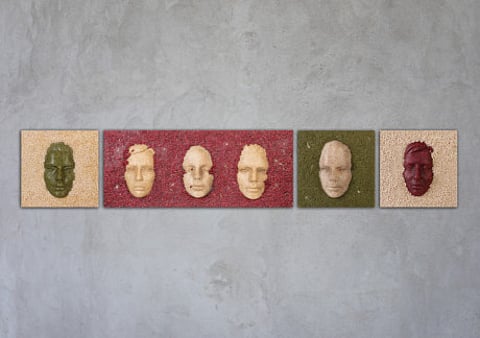Listening to the silence
Kourosh Golnari wants to acknowledge women who face the hardships of life with strength — by telling the stories of strong and wise Iranian women

Iranian sculptor Kourosh Golnari’s first exhibition in Dubai, Reticence, explores a part of history that is unknown because it has been excluded from the narrative by the powerful men who control it. His graceful sculptures of faceless, lipless women represent the feminine voices that remain silent and unheard in a male dominated world. By telling the stories of strong, wise and talented Iranian women, the artist wants to acknowledge and appreciate the contributions of all women around the world. He wants to listen to their silence and question the reticence of men across the ages.
“Narration, by nature, requires omission, and since the history we know is only what was narrated, the unspoken has often gotten left behind. Intrigued by this reticence, I set on a path to patch this unknown from the past to the present, seeking to represent the omitted. However, what is lost can never be coherent, and hence, the vague and the mysterious are what truly depict the unspoken history of femininity that can be felt amongst the narrations of men in Iran’s pictorial past. It is this iconic visage that manifests as an allegory for the women of this land across mediums and scriptures, and for me, this lipless, faceless and wordless countenance today represents a narration of the history of their silence — a narration of the untold,” he says.
Golnari likes to experiment with different media and materials. For this exhibition, curated by Vida Heydari and his first outside Iran, he has worked with many new materials. The artworks he is presenting include videos, paintings, installations and sculptures made from steel, bronze, ceramic, glass and pulses.
Each work tells a story, highlighting different facets of a woman’s life in a man’s world. In many of the works, Golnari has placed a crown on the woman’s head — both as an act of empowering her as well as of recognising the power, wisdom, compassion and contribution of the unsung women hidden behind powerful men.
Golnari has chosen steel to portray the legendary female warrior Gordieh, whose heroic fight to death to save her people is mentioned in the Persian epic Shahnameh. His shiny sculpture shows her dressed in armour and wearing a pointed sword-like crown with scenes from her battles etched on it. “This work is about women who are prepared to fight for what they believe in despite the restrictions imposed on them,” the artist says.
Kaniz — a bronze sculpture of a veiled woman is also about a brave woman but a real one from contemporary times who is fighting a different battle. “I met Kaniz in a remote town in Iran and was fascinated by her story. She was married off at a very early age and has faced many struggles in her personal life, but she continues to work hard to support her family by doing the unpleasant job of drying fish and grinding it to make animal feed. Yet, in the little free time she has she creates beautiful artworks and has covered the walls of her modest home with her vibrant paintings. She represents the many women in Iran and around the world who work so hard to take care of their families and face the hardships of life with strength and resilience,” Golnari says. The artist has also made a video about Kaniz showing the harsh weather and environment in which she lives and works and giving details of her story.
Another veiled figure, titled Goddess of Centuries, refers to the well-known story of a Qajar era king who ordered the brutal killing of his minister. “The minister was a childhood friend of the king and I always thought of how devastated the dead man’s mother must have been at this betrayal. This sculpture of her grieving quietly beneath the veil represents all women who have had to suffer quietly and hide their feelings even when they were broken inside,” Golnari says.
In an eye-catching work, titled Everyday, the artist has used resin, chickpeas and lentils of different colours to create a series of wall mounted sculptures of women’s faces. This time the faces are well defined with some showing the eyes wide open. “Today there are many intelligent, educated women who after marriage feel pressured to just confine themselves to the home and kitchen. I want to question why this is happening in the 21st century,” the artist says.
The show also includes installations where the artist has represented exploitative patriarchal traditions with swords mounted on a Persian carpet and Persian ghashghai hats arranged over painted wooden trinket boxes. Other installations feature multiple copies of the larger sculptures symbolising the repetition of the reticence throughout history.
Golnari also worked with Iranian craftswomen to create a set of portraits of women embroidered on canvas. “This show is about women, so I wanted to bring in a feminine touch. I imagine that the women in these paintings are looking at history and laughing at it,” he says.
Jyoti Kalsi is an arts-enthusiast based in Dubai.
Reticence will run at 1x1 Gallery, Alserkal Avenue, Al Quoz, until June 30.


